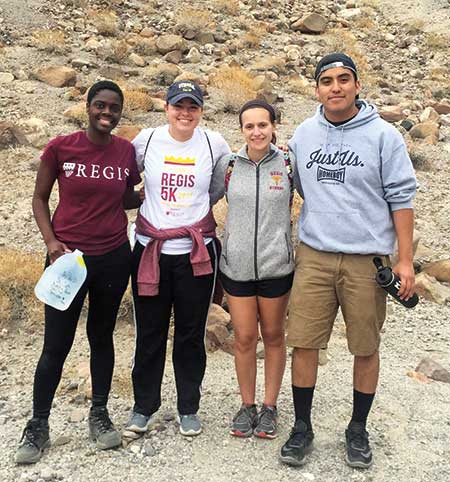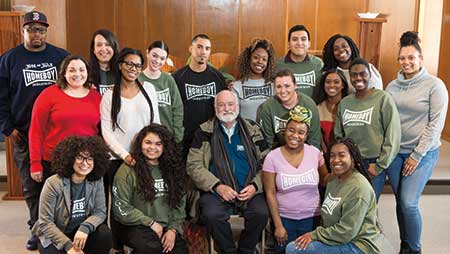
Left to right: Jenny Vernet ’18, Erin Loehner ’18, Brianna Howe ’20, and Steven Reyes ’20 in the desert of the U.S./Mexico border dropping emergency supplies for immigrants.
Rising sophomore and social work major Alexa Cuellar didn’t waste any time getting involved in Regis service as a freshman. As a work-study student in the Center for Ministry and Service and a member of the Center’s Dear Neighbor Club, Cuellar not only participates in the service work, she helps to plan the experiences. The Chelsea, Massachusetts, native is a member of the Regis Honors Program and a recipient of the Sister Thérèse Higgins Sisters of St. Joseph Scholarship. Here, Cuellar shares her powerful experience on her first Regis service trip to California.
When I heard about the Regis service trip to Los Angeles and the United States/Mexico border, I felt a strong connection to go because it was so close to home: My parents fled the civil war and political terror of El Salvador and immigrated to the United States for a better life. Going on this service trip was a way for me to learn and advocate for my family through my college experience. The issues of immigration and social injustice in Los Angeles and San Diego communities are similar to what I experienced growing up in the Boston suburb of Chelsea. This service trip was my chance to help fix a broken society.

Father Greg Boyle, S.J., Visits Regis During Heritage Week
The Regis community welcomed Father Greg Boyle, S.J., founder of Homeboy Industries, the largest gang intervention, rehabilitation, and re-entry program in the world. Father Boyle has been a leading force of change through his groundbreaking social justice work in Los Angeles, a community that Regis students visit as part of service immersion trips to Los Angeles, California, and the United States/Mexico border. His book, Tattoos on the Heart, was the 2017 “Common Read” for first-year seminar students.
During Heritage Week in March, Father Boyle met with Regis students in the Peace Room (photo above). He spoke to the entire Regis community and visited with students who worked with Homeboy Industries as part of their service immersion experience.
My first few days in Los Angeles were truly inspiring and motivational. We immersed ourselves in the community of the Dolores Mission Church in Boyle Heights. We learned about the powerful influence of the strong women of Dolores Mission—particularly their work to make the environment safer through their will and courage for restorative justice and equality. We also visited Homeboy Industries, a gang intervention program. (See sidebar right) I saw former gang members being cared for and treated as individuals defined not by the tattoos on their skin but by the tattoos on their hearts. In just four days, I learned about the impact of compassionate people compelled to stop violence and injustice and to seek change. I learned that nothing is impossible.
The last three days of our trip focused on the border and the problems that migrants face on their journey to the United States through San Diego. We dropped gallons of water and bags filled with blankets and canned food for migrants in the desert. I was moved when we visited Friendship Park, where families and loved ones from the United States and Mexico interact through the metal bars of the wall. The name is very ironic because there is no sense of “friendship” when families are separated by a border, when children are meeting their parents for the first time with limited time and no physical interaction, and when the idea of friendship and family only applies to the “American” families in the U.S. but not the minorities. The tears of numerous people leaving their loved ones brought tears to my eyes but also inspired me to help unite, reform, and improve the immigration system in our country.
Working at the border was a very emotional journey for me because of what my mother, father, and family have endured. I experienced a glimpse of the path that many migrants embark on with the hopes of getting to the other side of a wall that is determining their future.
A Bright Light
It was a Sunday morning when we headed back to Boston. We knew that we had made a difference; but we had also sparked a movement within ourselves to return to our communities and make sure that the voices of those marginalized minorities are heard and understood without distinction.
“The tears of numerous people leaving their loved ones brought tears to my eyes but also inspired me to help unite, reform, and improve the immigration system in our country.”
I am honored to be a first-generation student and to have the opportunity to make my community, my family, and most importantly, my parents proud with the Sister Thérèse Higgins Sisters of St. Joseph Scholarship I received. I will continue to advocate for immigration rights through my social work degree because immigration rights are human rights; they are what make America great. Immigrants are our friends, colleagues, classmates. They are everywhere and everything. Immigrants are our dear neighbor, and to me, they are my family. I am so grateful for this experience Regis gave me because when I left California, I arrived home with a new motive in life—with a new fire in me that won’t burn down. That fire will light up those dark corners shunned by our society and bring them to the light.
Read more articles
Read the entire magazine in PDF format